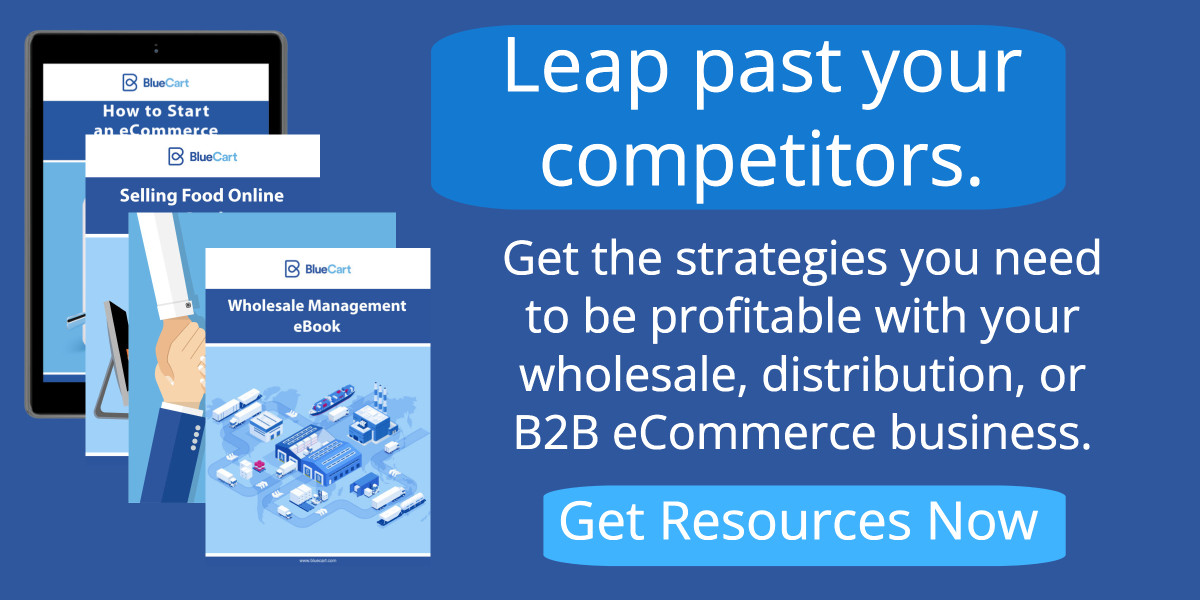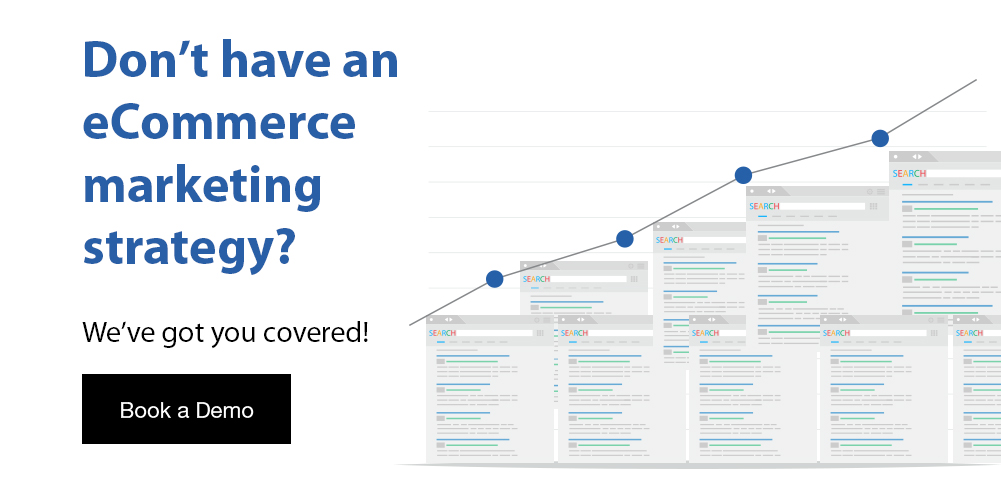So, what is omnichannel marketing? How does it make life easier for B2B wholesale distributors? Why should you consider the omnichannel distribution model?
B2B marketing has evolved from when a wholesale distribution company can simply run a Facebook or LinkedIn advertising campaign and wait for customers to fall in. Customers do not just ‘fall in’ anymore.
Key Takeaway: With the rise of B2B eCommerce platforms, omnichannel marketing channels, online wholesale marketplaces, social commerce, and online ordering platforms, the average customer is getting harder to convince with simple cross-channel wholesale marketing strategies. Meaning, your eCommerce marketing team needs to up their game.
For instance, a restaurant seafood business wants to buy wholesale restaurant supplies and wholesale seafood. They search online for wholesale food distributors and find your seafood distribution business listed on a wholesale directory.
What happens next? Of course they read about your services, get excited about your business and click on the link to your website. Does this story end here? For many B2B businesses, it does, with no way to track customer data or history.
The truth is, this same restaurant business probably found thirty more wholesale seafood distributors and enjoyed their omnichannel customer experience, omnichannel order fulfillment, and eCommerce customer service delivery better. In the long run, you begin to lose customers to your competitors.
Now, to the initial questions that bought you here. What is omnichannel marketing and why does it matter to B2B wholesale distributors? Let’s find out together!

What is Omnichannel Marketing?
Omnichannel marketing is the coordination and integration of the different channels that businesses use to communicate with customers in order to establish a unified brand experience. Physical (such as brick and mortar stores) and digital channels are included in this (e.g. eCommerce websites).
An omnichannel marketing strategy aims to give customers a simple, seamless experience that provides a variety of chances for satisfaction. There are now countless ways for customers to interact with brands, from social media to customer care hotlines.
As customers progress down the B2B sales funnel, omnichannel marketing integrates branding, message, and online and physical touchpoints seamlessly. This results in a more significant customer experience.
eCommerce personalization is the new keyphrase in B2B marketing and one of the best ways to achieve this is by adopting omnichannel marketing strategies. The truth is that customers want to be in control of their own purchase journey.
Eager to unlock the secrets of how marketplace platforms like eBay, Amazon, and Etsy thrive? Learn the ins and outs of marketplace business models and discover strategies for your own successful online venture.
What Is the Difference Between Omnichannel and Multichannel Marketing?
To explain the difference between omnichannel and multichannel marketing, it is important to also understand what single channel marketing is.
Single Channel Marketing
This marketing strategy only uses one channel for purchases. A customer enters a physical store, talks with a salesperson about their selections, and then purchases their chosen item.
Multichannel Marketing
This channel includes numerous platforms where customers can learn about a good or service, including physical stores, online shops, websites, email, etc. Each channel in a multi-channel strategy essentially serves as a separate silo. The brand is the focus of this strategy.
Omnichannel Marketing
Rather than just serving the interests of the consumer alone, all communication channels collaborate in an omnichannel approach to inform and empower the consumer. In other words, the customer is at the center of this strategy.
How Does Omnichannel Marketing Work for B2B Wholesalers?
Remember the story from earlier? It could have been a happier ending if after the restaurant found your website and social media channels, your marketing team was able to identify the specific touchpoint that triggered a response from the customer in the first place.
So, the story, without an omnichannel marketing strategy, would be that the seafood restaurant found your website, checked out your social media pages, and then found an email address. The customer proceeds to send a message to your sales team, but, because you are more interested in making a sale as a wholesale seafood vendor, your sales strategy does not take into account the stage of the customer in the purchase process.
Now, at this stage, you send numerous hit-and-miss emails because there is no system to track what the customer wants. Before too long, your competitors, with an omnichannel strategy in place, swoops in and steal the win.
However, with an omnichannel marketing strategy in place, this is what could have happened:
- The sales development team, for instance, would be able to immediately identify the customer has already expressed interest in your product via the website, saving time by not having to repeat the same engagement on a new channel.
- A follow-up promotion via a live chat can then be sent by that team to the customer asking if they require any additional information regarding the particular product. This might result in a videoconference to discuss the advantages of the product or even a straight purchase.
- Once the first sale process is completed, the customer still has the power to choose if they want to change their channel of communication, without having to re-introduce themselves on their channel.
While this model sounds like the features of a very good wholesale CRM platform, customer relationship management is just one part of the bigger omnichannel picture. B2B players must develop a thorough understanding of each customer and communicate consistently across channels in order to offer seamless end-to-end omnichannel journeys.
B2B consumers frequently communicate with suppliers over ten or more channels, therefore it's critical that the journey be fluid and the message evolve with each new encounter. Suppliers can interact with customers through their preferred channels at any time, anywhere, and at the customer's convenience.
The mistake most wholesale businesses make is that they view marketing and sales channels as separate silos (multichannel). However, they should manage these channels as a collection of connected tools that a customer might want to utilize at various stages of the decision-making process or throughout their relationship with a supplier.
CRM systems that give visibility to the full customer experience are used by effective ecommerce businesses. With the use of these technologies, they are able to mix leads from various sales channels and departments. No matter where a consumer makes their final purchase, a seamless experience for customers can be established.

3 Benefits of Omnichannel Strategy for Wholesale Distributors
Given the higher expense and difficulty of getting new b2b clients, the belief that omnichannel marketing is a more effective way to prospect and secure new business than traditional, ‘face-to-face only’ sales approaches is noteworthy. 83% of B2B experts agree.
Let’s look at other benefits of adopting an omnichannel marketing approach:
- Improved Customer Lifetime Value
A brand that consumers trust will always be their first choice. Omni-channel marketing offers a unified user experience on all platforms. Every platform caters to a diverse audience with a distinct and personalized message.
It's understandable that customers want to stick with companies that put them in the driver's seat because an omnichannel experience puts the customer first. As a result, the customer retention rate is increased, and the customer lifetime value increases.
- Better Business Workflow
Increased operational effectiveness and cost savings are two advantages that businesses may experience from omnichannel strategies. Businesses just need to collect customer data once, as opposed to at each touchpoint, when they use an omnichannel strategy.
The development of a comprehensive perspective relieves businesses of the burden of developing and putting into practice strategy for every channel.
One truly remarkable benefit of omnichannel is that it employs a system in which numerous units collaborate to achieve a single objective rather than having individual units operate independently for their own aims. As a result, you will have integrated resource planning for sales, marketing, and inventory that is focused on a single objective.
- Increased Sales Processes
Customers are encouraged to interact with brands through several touchpoints and channels when using an omnichannel strategy. Research indicates that clients that engage with many touchpoints tend to be 30% more valuable, therefore these enhanced, varied engagements at each stage of the buyer's journey can help increase revenue.
Increased ROI (Return on Investment) is one of the most critical metrics in any marketing project. The effectiveness of an omnichannel marketing approach can be greatly increased with precise segmentation and personalization. More conversions and a high ROI will result from greater customer involvement.
The likelihood that a customer will buy from your brand again increases thanks to this more focused messaging's ability to foster loyalty. Even though they make up a smaller fraction of your customer base, repeat customers typically account for 40% of your sales.

Frequently Asked Questions About Omnichannel Marketing
Here are some answered questions about omnichannel marketing.
What are the Benefits of Using Omnichannel Marketing?
The benefits of using omnichannel marketing include the following:
- Better brand recognition
- Reduced churn
- Improved customer loyalty
- Excellent customer support
- Higher revenue
- More purchases and closed deals
- Enhanced customer lifetime value
- Better customer experience
- New audience segments
- Higher customer engagement
What are the Challenges of Omnichannel Marketing?
The challenges of omnichannel marketing includes the following:
- Poor content approach
- Incorrect user data use isolated analytics measurement
- No action has been taken in response to fresh information
- Poorly performing marketing plan
- Ineffectiveness in execution
- Not tracking the appropriate eCommerce KPIs at each level
What are the 5 Key Indicators?
The five key indicators of a successful omnichannel marketing strategy are:
- Revenue growth
- Revenue per client
- Profit margin
- Client retention rate
- Customer satisfaction
Tune Out the Noise
With the help of an omnichannel marketing strategy, businesses can reach customers when and where they're ready to be reached. It takes time and the correct approach to deliver a best-in-class experience with a brand that informs customers about the important information.
In essence, it's up to you to determine whether an omnichannel approach is a suitable fit for your business. Keep in mind, though, that with targeted messages and a flawless user experience, you'll always be one step ahead of your rivals and one step nearer to your audience.
Businesses are able to provide a seamless customer experience that takes into account the client's past touchpoints along the customer journey through omnichannel marketing. In addition to improving engagement, ROI and sales, and improving customer retention and loyalty, this helps to build brand awareness in the minds of consumers.